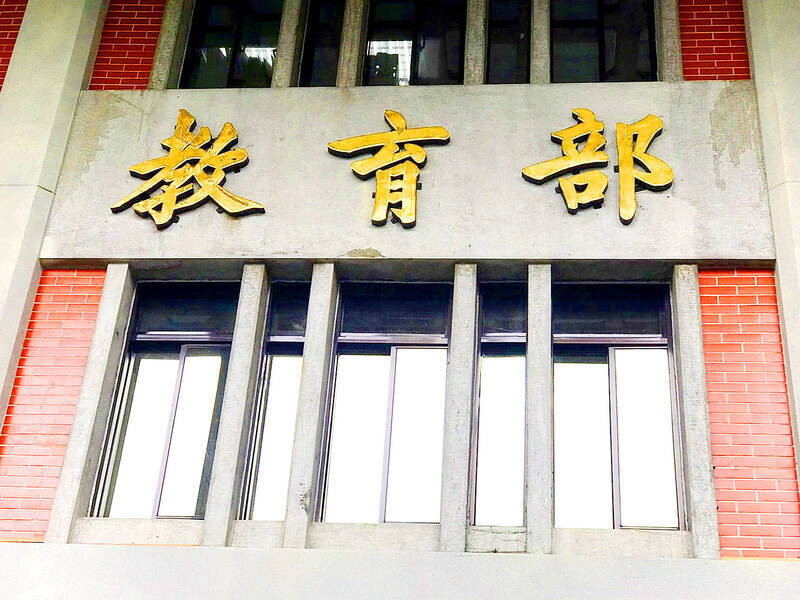As demand for top students from countries included in the government’s New Southbound Policy increases, universities are setting up departments or launching academic programs related to Southeast Asia, with the number rising to nine institutions and 874 enrolled students from five institutions and 381 students seven years ago.
National Chi Nan University (NCNU) and Wenzao Ursuline University of Languages (WZU) established Southeast Asian studies departments, while most of the nine universities offer related degree programs.
National Chengchi University (NCCU) plans to upgrade its Bachelors Program in Southeast Asian Languages and Cultures into a department in August.

Photo: Rachel Lin, Taipei Times
Ministry of Education Department of Higher Education director-general Chu Chun-chang (朱俊彰) said yesterday that NCCU’s decision shows it is placing more importance on talent cultivation in Southeast Asian studies, while the nine universities are cultivating students with knowledge of Southeast Asian languages and culture.
Taiwanese businesses covered by the New Southbound Policy need a diverse range of talented employees, so graduates from other academic fields are also important, Chu said.
The other six programs or departments of the nine are: Chang Jung Christian University’s bachelor’s degree program in Southeast Asian cultures and industries; Shih Chien University’s bachelor’s program in Southeast Asian Intelligent Commerce; National Taipei University of Education’s master’s program of business administration in Southeast Asia; National Kaohsiung Normal University’s graduate program of Southeast Asian studies; National Taiwan University of Sport’s Southeast Asian doctoral program of sport management; and National Kaohsiung University’s Department of East Asian languages and literature’s Vietnamese group.
The NCCU program had 16 students in its first year in 2017, with the number growing to 158 last year.
NCCU College of Foreign Languages and Literature deputy dean Chao Chin-chi (招靜琪) said talent in the manufacturing, electronics and financial industries are urgently needed in policy countries, so they have established cooperative mechanisms with the university, providing intern opportunities, introducing foreign teachers, and setting up courses with universities in Vietnam and Thailand.
NCNU offers the most overarching education on Southeast Asian studies, from undergraduate programs to doctoral programs, part-time programs for in-service adults, as well as continuing education credit courses, Chao said.
NCNU president Wuu Dong-sing (武東星) said that students in its program learn technical and business management.
The language courses include Business Vietnamese, while others focus on local politics, economics and cultures, Wuu said.
The university subscribes to journals from Southeast Asia countries, he said, adding that Taiwanese companies in the countries search for talent from the university in their junior or seniors years.
WZU has Indonesian, Thai and Vietnamese language groups in its Department of Southeast Asian Studies.
Department chair Lin Wen-pin (林文斌) said that enrollment was nearly full when it started in 2019, while a monthly internship allowance to study in Southeast Asian countries has increased more than NT$10,000, from NT$40,000 to NT$50,000, on top of accommodation, food and plane tickets.
Some companies attract students with salary offers of more than NT$1 million, Lin said.
However, some experts recommend that students not only learn the languages, but also have other professional skills to complement those skills, he said.

Beijing could eventually see a full amphibious invasion of Taiwan as the only "prudent" way to bring about unification, the US Department of Defense said in a newly released annual report to Congress. The Pentagon's "Annual Report to Congress: Military and Security Developments Involving the People's Republic of China 2025," was in many ways similar to last year’s report but reorganized the analysis of the options China has to take over Taiwan. Generally, according to the report, Chinese leaders view the People's Liberation Army's (PLA) capabilities for a Taiwan campaign as improving, but they remain uncertain about its readiness to successfully seize

Taiwan is getting a day off on Christmas for the first time in 25 years. The change comes after opposition parties passed a law earlier this year to add or restore five public holidays, including Constitution Day, which falls on today, Dec. 25. The day marks the 1947 adoption of the constitution of the Republic of China, as the government in Taipei is formally known. Back then the Chinese Nationalist Party (KMT) governed China from Nanjing. When the KMT, now an opposition party in Taiwan, passed the legislation on holidays, it said that they would help “commemorate the history of national development.” That

Taiwan has overtaken South Korea this year in per capita income for the first time in 23 years, IMF data showed. Per capita income is a nation’s GDP divided by the total population, used to compare average wealth levels across countries. Taiwan also beat Japan this year on per capita income, after surpassing it for the first time last year, US magazine Newsweek reported yesterday. Across Asia, Taiwan ranked fourth for per capita income at US$37,827 this year due to sustained economic growth, the report said. In the top three spots were Singapore, Macau and Hong Kong, it said. South

Snow fell on Yushan (Jade Mountain, 玉山) yesterday morning as a continental cold air mass sent temperatures below freezing on Taiwan’s tallest peak, the Central Weather Administration (CWA) said. Snowflakes were seen on Yushan’s north peak from 6:28am to 6:38am, but they did not fully cover the ground and no accumulation was recorded, the CWA said. As of 7:42am, the lowest temperature recorded across Taiwan was minus-5.5°C at Yushan’s Fengkou observatory and minus-4.7°C at the Yushan observatory, CWA data showed. On Hehuanshan (合歡山) in Nantou County, a low of 1.3°C was recorded at 6:39pm, when ice pellets fell at Songsyue Lodge (松雪樓), a